Sunday Feb 15, 2026
Sunday Feb 15, 2026
Thursday, 24 September 2020 00:39 - - {{hitsCtrl.values.hits}}
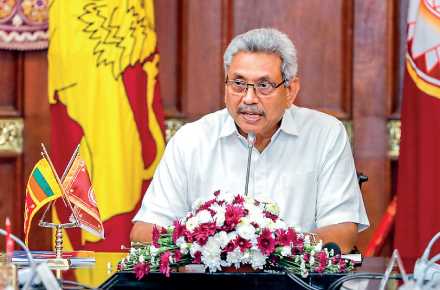
The power-grab and the blackout of large sectors of the audit grid constitute a strategic blunder by President Gotabaya Rajapaksa
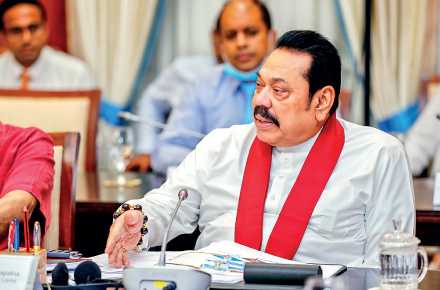
Mahinda Rajapaksa knows that the more diffuse the distribution of power in a system, the more responsibility is institutionally shared
I am proud that the Editors’ Guild of Sri Lanka, of which my father was the Founder-President, was one of nine media industry bodies/organisations to express “deep concern” over aspects of the 20th Amendment and their potential to “negatively impact Sri Lanka’s democratic institutions”. Mervyn de Silva would have endorsed the statement, had he lived. He founded the Lanka Guardian magazine in May 1978 as a critical civic alternative at the moment of ‘High Authoritarianism’.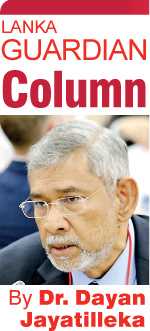
The monopolisation of power through the 20th Amendment turns the Presidency into a monarchy by another name – which the Founding Fathers of the USA, having fought a revolution and liberated themselves from monarchy (‘Mad King George’), explicitly wished to avoid when they created the Presidency. With the militarisation of civil administration running parallel, the 20th Amendment arguably turns that elected monarchy into a military-backed dictatorship.
The power-grab and the blackout of large sectors of the audit grid constitute a strategic blunder by President Gotabaya Rajapaksa. If the President and his inner-circle understood politics, or adhered to the Clausewitzean dictum that ‘war is a continuation of politics’ rather than standing it on its head and regarding politics as a continuation of war, they’d know what Prime Minister Mahinda Rajapaksa’s ‘Committee Report’ initiative was trying to save him and the government from: the over-accumulation of power at the very top, which soon turns the Presidency into a much bigger and singular political target, socially, nationally and internationally (whatever the Cyril Mathew-ite racist diversions by the local Fox News).
Mahinda Rajapaksa, a political maestro, knows that the more diffuse the distribution of power in a system, the more responsibility is institutionally shared, the less of a target the person at the top is, and conversely, that the more power is concentrated in the person at the top, the more he/she is responsible for anything and everything that goes wrong and becomes a magnet for discontent, making the government and the entire system (not to mention the ruling family) vulnerable. No target-hardening by a ditch-bund-bunker-shaped new Constitution can stop it.
The political drama of the 20th Amendment must be watched on slow-motion ‘action replay’. The despotic draft sent tremors across the political spectrum, triggering strong criticism from the Opposition and concern from within the Government and its supportive strata. The authors of the amendment remain anonymous.
The critics from within the Government and alongside it included those who were part of the ‘GR bloc’. This rising internal dissent initially met with a flexible response from President Gotabaya Rajapaksa. The media approvingly reported that he had expressed readiness to rescind the draft and urged his loyal critics to produce a fresh draft or rectifications.
The scene then shifted to Prime Minister Mahinda Rajapaksa who convened a group of Ministers, including those who were drivers of the ‘GR for President’ project such as Gammanpila and Weerawansa, and tasked them with producing a position paper. Displaying due diligence, they produced it within the PM’s 48-hour deadline. Udaya Gammanpila was seen on TV news in conversation with a Mahanayaka, praising the open-minded and self-correcting nature of President Gotabaya.
President’s pivot
The PM’s Ministerial committee could never present its report to the President. Even when the Cabinet convened, no one, not even the PM, presented it, because the President pivoted, reversing his earlier-stated position and declaring that there would be no modifications at this stage of the process—the original draft of 20A would be the one presented to Parliament.
The PM and the Cabinet caved, either because they were convinced by the President’s argument or because the latter was testily determined and the PM did not wish to risk a confrontation.
The President did not mind the impression created by changing his position from flexibility to rigidity. He revealed himself as a leader impervious to feedback, including signals from his iconic brother.
If the President was going to remain unmoved why did he signal flexibility to those including Sinhala nationalist delegations that met him?
 |
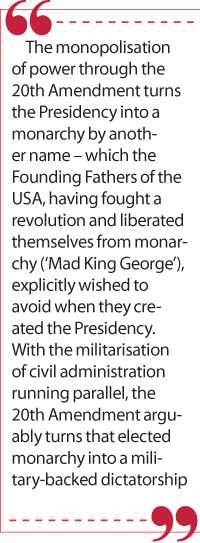 |
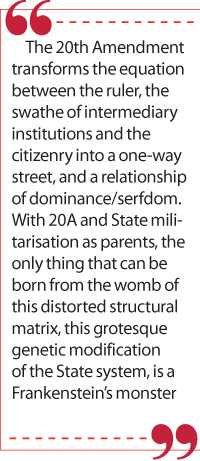 |
An uncharitable interpretation would have it that as a decorated combat commander he permitted the PM and his Cabinet committee to make their move and then ambushed them and made ’em raise a white flag, in order to make a point in full public view. A more charitable view is that he was lobbied by his brother Basil who didn’t wish to go through the legitimation process of renouncing his US citizenship as GR did.
Having interacted during the war years (the first MR term), worked intermittently with Gotabaya Rajapaksa in public affairs for around two years (2015-2017), and swapped notes with a 1956 celebrity who knew him in LA, that’s not what I think happened. He is a dualistic personality: one side is a lucid, reasonable, conservative realism, affable openness and managerial-technocratic prowess; the other side inhabits the values, philosophy and worldview of Colonel Nathan Jessup, the hard-charging character played memorably by Jack Nicholson, with Tom Cruise as counterpoint, in A Few Good Men (1992).
This dualism can be healthy in that Gotabaya Rajapaksa is not, all the time or even usually, the most instinctively hawkish person in the group he surrounds himself with or which surrounds him. However, in the final analysis, he tends to go along with the most hawkish position.
This isn’t an unknown phenomenon, as accounts of the George W. Bush presidency make clear. Colin Powell and later Condoleezza Rice tried to counterbalance and ratchet-down the influence of Vice-President Dick Cheney and Defence Secretary Donald Rumsfeld, and found it Sisyphean labour. In Sri Lanka today we have Cheney and Rumsfeld equivalents. If the PM tried to play Colin Powell, he failed (as did Powell).
Rigidity isn’t strength
President Gotabhaya Rajapaksa belongs to two Bands of Brothers, the Rajapaksas being just one of them. The other regards flexibility a weakness, and compromise, surrender. Their collective persona reminded me of General James Mattoon Scott, US Chief of Staff (based on General Curtis Le May), played indelibly by Burt Lancaster in Seven Days in May (1964).
The President’s shock-and-awe operation has shown the PM, the Ministers and MPs where exactly they stand, and in full public view. This is akin to President Trump playing to his hardcore constituency by trashing the Republican establishment and officialdom, but in the Sri Lankan case it is something steelier. It reneged on a promise the President gave his Sinhala nationalist caucuses, and kicked back a pragmatic initiative by his legendary brother.
The President’s argument is that 20A is temporary and transitional to an impending new Constitution. Why then this swift seizure of power? The Rajapaksa ‘family project’ is not the most decisive factor in the GR presidency’s decision-making, because if it were, a win/win compromise was certainly possible with the PM’s initiative of resetting 20A through the Ministerial panel’s report.
It also seems that within the ruling family there is also a new sibling alignment and a new hegemon, based not upon seniority, experience or historic achievement. The new Godfather is President Gotabaya.
If the PM and Cabinet are treated with such scant regard while 19A is still in place, one can well imagine what things will be like for everyone after 20A replaces it. The calculation is that the hardcore constituency will applaud, and the setback for the PM and Cabinet are a small price to pay for sending a clear signal of unbending Presidential authority and irreversibility of decision-making. The downside is that it reveals rigidity, capriciousness, and razor-edged angularity, rather than real inner strength and long-range strategic wisdom.
The Gotabaya Presidency is nothing like any previous Presidency including that of JR Jayewardene. All previous Presidencies since 1978, and indeed all Sri Lankan leaders since 1948, practiced the politics of balance, negotiation and consensus. President Gotabaya Rajapaksa was also about to, but let himself be prevailed upon to disregard consensus-building in favour of unipolar unilateralism.
Analysis of the regime as ‘majoritarian-populist’ has been disproved by the President who reversed a concession to the populist-nationalist Pohottuwa ranks. This is not a nationalist-populist rulership style and political subculture; it is a rigid, Hard-Right, militarist, ‘commanding officer’ style and subculture of governance.
It would be wrong to see the regime—including the ruling family—as a monolith, free of internal contradictions. It would also be wrong to assume that internal dissent could spearhead a democratisation movement. The weak potential of internal dissent was proven by the headlong retreat into conformity of the PM and Cabinet on 20A. Latent contradictions will turn into a spiderweb of fissures over the years, but cannot be counted upon, still less passively awaited.
A model of tactics against a family-centric autocracy can be gleaned from J.R. Jayewardene as UNP Leader and Leader of the Opposition in 1973-1977. He identified and targeted the two elements that constituted the most dictatorial nodal points in the government: (a) the rightwing Felix Dias Bandaranaike (nicknamed ‘Satan’ by the LSSP) who was the first to advocate the doctrine that drives the Gotabaya regime, namely “a little bit of totalitarianism”, and (b) the pro-China, pro-Gang-of-Four, pro-Khmer Rouge ‘Janavegaya’ clique led by Madam Bandaranaike’s oldest offspring and son-in-law. JRJ launched a Parliamentary motion of no-confidence against the Janavegaya clique, accusing it of plotting to violently subvert democracy, together with Sinhala nationalist ex-military officers.
Opposition political strategy
While liberal democrats rightly advocate the separation of powers and invoke popular sovereignty, a quarter-century of neoliberal reformist downgrading of national security, beginning with the mollycoddling of Prabhakaran’s LTTE and culminating in the Easter massacres, has made the Lankan citizenry accept a Hobbesian trade-off (not a Faustian bargain) of individual and civic space for the restoration of a ‘Security First’ policy by the State.
As a political scientist who is also a Realist, I recognise that a Lockean separation of powers and Rousseau-esque republican popular sovereignty can be built back only upon the foundational Hobbesian Social Contract which guarantees security and safety.
Contrary to neoliberal civil society claims, the abolition of the Executive Presidency has been incidental at best, and irrelevant at worst, for citizen-voters at Presidential Elections. CBK won in 1994 because the UNP had been devastated by LTTE assassinations—Ranil being the only one Prabhakaran never wasted his time attempting to target—and its candidate, the widow of the late Gamini Dissanayake, was not even a member of the UNP. MR won because the choice was between him and Ranil, and he was the only one who would stand up to Prabhakaran. MR beat SF because the people rewarded him for having given the political leadership that no other President had, winning the war while warding-off foreign interference. MS beat MR because the SLFP fissured with the Bharatha Lakshman killing.
The Executive Presidency has never been abolished under successive Presidents who were vastly different from each other, because there was no national-popular traction when it came to decapitating the Presidency. Nobody could get a two-thirds or risk a referendum.
By contrast, an unprecedented (under PR) two-thirds majority has been obtained precisely for re-strengthening a weakened, dysfunctional Executive Presidency.
From Latin America to East Asia, waves of democratisation which displaced military-backed authoritarianism have shown that an absolute imperative of successful anti-dictatorial strategy is an enlightened nationalist/patriotic/‘sovereignist’ platform which incrementally wins the support of the armed forces, gradually thawing continued military underpinning of autocracy and obstruction of democratisation.
Therefore, when NGO-neoliberals who supported the PTOMS giveaway to Prabhakaran, now brand the mainstream Opposition as ‘Rajapaksa Lite’, utterly unconcerned about the risk of it being branded ‘Ranil Lite’ and ‘UNP clone’, I’d say the Opposition is back in contention.
After 20A
Most Sinhalese want a strong Presidency capable of swift decision-making on matters of defence, national security and sovereignty. Some want a dictatorship, while most want a democracy. We need a Presidency as in the USA, France, Mexico, South Korea, Indonesia, etc. That’s not what 20A creates. It creates a Darth Vader presidency.
The 20th Amendment changes the set of interrelationships between the ruler and the State structures and institutions, overriding all autonomy and separation of spheres of influence, completely altering the balance within the State, and thereby, the very character of the State system itself.
The dictatorial State that the 20th Amendment is the doorway to, will not be the nationalist paragon of sovereignty and independence that it postures as. It will be a dependent dictatorship; a client despotism, economically, politically, strategically and psychologically dependent upon a rising metropolitan centre with a political system that is alien to or has been superseded in South Asia.
The Chinese political model works very well for China, and China’s stability and success are good for the rest of us as a counterweight, but the Sri Lankan regime is gravely erring by adopting and adapting the closed, centralised Chinese political mode. The domestic permeation of its political-ideological influence, as distinct from its positive economic, diplomatic and strategic balancing value, is negative; a retrogression in a democratic South Asia.
The 20th Amendment transforms the equation between the ruler, the swathe of intermediary institutions and the citizenry into a one-way street, and a relationship of dominance/serfdom. With 20A and State militarisation as parents, the only thing that can be born from the womb of this distorted structural matrix, this grotesque genetic modification of the State system, is a Frankenstein’s monster.
The story began on the other side of the island. The cult of a strongman who embodies the ‘Will of the Nation’; the fetishism of the heroic military; the ubiquity of uniforms and guns; the shadowy omnipresence of intelligence agencies; the military drilling civilian recruits; aggressive nationalism and sacralisation of one’s ethnonational community; the argument that the cohesion and unity of the nation requires and justifies dictatorship; the exaltation of imposed discipline and militarisation of all sectors; the applause of the very rich and the elite professionals; the contemptuous dismissal of human rights and civil liberties; the doctrine that absolutely anything goes in the cause of your nation; the abandonment of right and wrong, good and bad; the rejection of universality, moderation, prudence and wisdom—these defined the ethos of Tamil society in the north-east and the diaspora, during the reign of Prabhakaran and his Tigers.
Now, the south, Sinhala society, is going through its parabolic Prabhakaran/Tamil Eelam moment – Sinhalised of course, and processed through an electoral portal.
It’s Prabhakaran’s posthumous revenge. The protracted close encounter with him has sickened our conscience, possessed our souls. His totalitarian Tamil Eelam has infiltrated the unconscious of some who fought him, and is imprinted, mirrored in their mentalities. We are becoming the evil enemy we hated, defeated. We are building a Sinhala-Buddhist Eelam.
The new Constitution will construct a State that imprisons an island.
Power is a drive. Rulership, unconstrained, is inherently self-expansionist. A tight, closed, unbalanced ‘Pharaonic’ political system is a system with zero-equilibrium, a system in permanent disequilibrium; unsafe, unstable, unsustainable. Unbound executive power without ‘cruise control’, is the nuclear reactor at its heart. It is intrinsically self-destructive: a constitutional Chernobyl